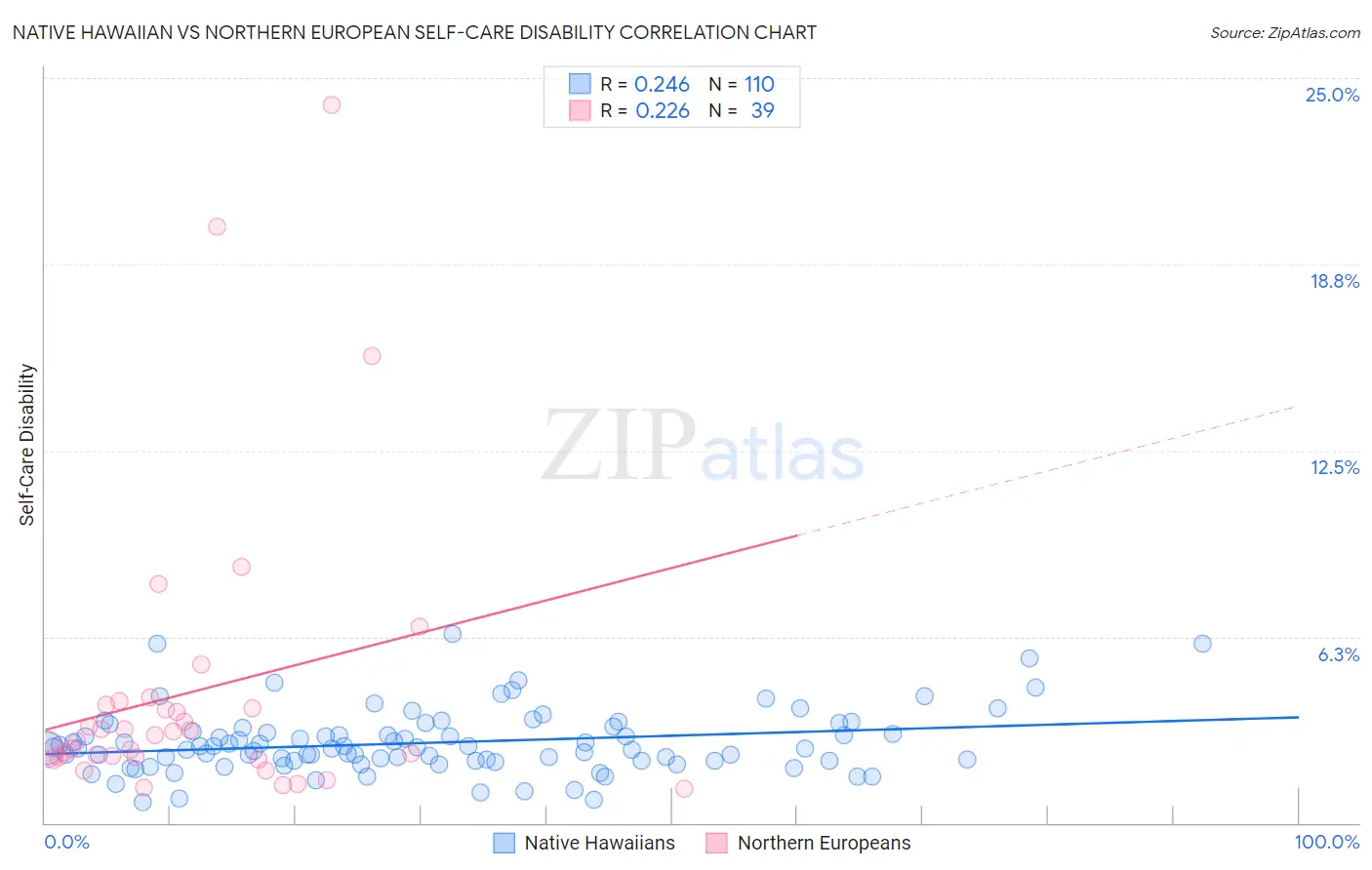Native Hawaiian vs Northern European Self-Care Disability
COMPARE
Native Hawaiian
Northern European
Self-Care Disability
Self-Care Disability Comparison
Native Hawaiians
Northern Europeans
2.6%
SELF-CARE DISABILITY
5.1/ 100
METRIC RATING
211th/ 347
METRIC RANK
2.4%
SELF-CARE DISABILITY
92.9/ 100
METRIC RATING
116th/ 347
METRIC RANK
Native Hawaiian vs Northern European Self-Care Disability Correlation Chart
The statistical analysis conducted on geographies consisting of 331,613,173 people shows a weak positive correlation between the proportion of Native Hawaiians and percentage of population with self-care disability in the United States with a correlation coefficient (R) of 0.246 and weighted average of 2.6%. Similarly, the statistical analysis conducted on geographies consisting of 405,623,897 people shows a weak positive correlation between the proportion of Northern Europeans and percentage of population with self-care disability in the United States with a correlation coefficient (R) of 0.226 and weighted average of 2.4%, a difference of 6.7%.

Self-Care Disability Correlation Summary
| Measurement | Native Hawaiian | Northern European |
| Minimum | 0.72% | 1.2% |
| Maximum | 6.3% | 24.1% |
| Range | 5.6% | 22.9% |
| Mean | 2.7% | 4.4% |
| Median | 2.5% | 3.0% |
| Interquartile 25% (IQ1) | 2.1% | 2.2% |
| Interquartile 75% (IQ3) | 3.1% | 4.0% |
| Interquartile Range (IQR) | 0.98% | 1.8% |
| Standard Deviation (Sample) | 1.1% | 4.9% |
| Standard Deviation (Population) | 1.1% | 4.9% |
Similar Demographics by Self-Care Disability
Demographics Similar to Native Hawaiians by Self-Care Disability
In terms of self-care disability, the demographic groups most similar to Native Hawaiians are Samoan (2.6%, a difference of 0.020%), Ecuadorian (2.6%, a difference of 0.12%), Immigrants from Honduras (2.6%, a difference of 0.12%), Immigrants from Thailand (2.6%, a difference of 0.16%), and White/Caucasian (2.6%, a difference of 0.19%).
| Demographics | Rating | Rank | Self-Care Disability |
| Immigrants | Bahamas | 11.9 /100 | #204 | Poor 2.5% |
| Immigrants | Russia | 11.0 /100 | #205 | Poor 2.5% |
| Alaskan Athabascans | 10.4 /100 | #206 | Poor 2.5% |
| French | 9.9 /100 | #207 | Tragic 2.5% |
| Central Americans | 8.7 /100 | #208 | Tragic 2.5% |
| Malaysians | 7.7 /100 | #209 | Tragic 2.5% |
| Panamanians | 6.4 /100 | #210 | Tragic 2.5% |
| Native Hawaiians | 5.1 /100 | #211 | Tragic 2.6% |
| Samoans | 5.1 /100 | #212 | Tragic 2.6% |
| Ecuadorians | 4.7 /100 | #213 | Tragic 2.6% |
| Immigrants | Honduras | 4.7 /100 | #214 | Tragic 2.6% |
| Immigrants | Thailand | 4.5 /100 | #215 | Tragic 2.6% |
| Whites/Caucasians | 4.4 /100 | #216 | Tragic 2.6% |
| Celtics | 4.4 /100 | #217 | Tragic 2.6% |
| Scotch-Irish | 4.1 /100 | #218 | Tragic 2.6% |
Demographics Similar to Northern Europeans by Self-Care Disability
In terms of self-care disability, the demographic groups most similar to Northern Europeans are Immigrants from North Macedonia (2.4%, a difference of 0.050%), Immigrants from Hong Kong (2.4%, a difference of 0.050%), South American (2.4%, a difference of 0.060%), Taiwanese (2.4%, a difference of 0.060%), and Scandinavian (2.4%, a difference of 0.12%).
| Demographics | Rating | Rank | Self-Care Disability |
| Slovenes | 94.1 /100 | #109 | Exceptional 2.4% |
| Immigrants | Africa | 93.7 /100 | #110 | Exceptional 2.4% |
| Serbians | 93.6 /100 | #111 | Exceptional 2.4% |
| Scandinavians | 93.5 /100 | #112 | Exceptional 2.4% |
| South Americans | 93.2 /100 | #113 | Exceptional 2.4% |
| Immigrants | North Macedonia | 93.1 /100 | #114 | Exceptional 2.4% |
| Immigrants | Hong Kong | 93.1 /100 | #115 | Exceptional 2.4% |
| Northern Europeans | 92.9 /100 | #116 | Exceptional 2.4% |
| Taiwanese | 92.5 /100 | #117 | Exceptional 2.4% |
| Immigrants | Canada | 92.0 /100 | #118 | Exceptional 2.4% |
| Immigrants | Sierra Leone | 91.8 /100 | #119 | Exceptional 2.4% |
| Uruguayans | 91.5 /100 | #120 | Exceptional 2.4% |
| Peruvians | 91.3 /100 | #121 | Exceptional 2.4% |
| Belgians | 90.9 /100 | #122 | Exceptional 2.4% |
| Immigrants | Nigeria | 90.3 /100 | #123 | Exceptional 2.4% |